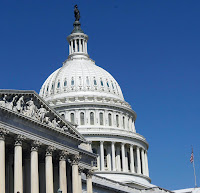For this Independence Day message, my sixteenth consecutive one, I want to turn to Calvin Coolidge. It may be true that Calvin Coolidge
was no Thomas Jefferson. But it is also true that Coolidge, our 30th
President, is greatly underappreciated.
Coolidge was a small-government conservative.
Alfred E. Smith, the Democratic nominee for President in 1928, said of Coolidge:
"He was distinguished more for character than for heroic achievement"
and that "his great task was to restore the dignity and prestige of the
Presidency" after the scandals of the Warren Harding era. If you want to
learn more, one of the best biographies is simply titled "Coolidge"
by Amity Shlaes.
Coolidge acquired the nickname "Silent Cal."
Upon learning of his death, writer Dorothy Parker remarked wittingly, if not somewhat
cruelly, "How can they tell?"
Indeed, President Coolidge, a man with a dry
sense of humor, said little that was superfluous. His address in Philadelphia
on July 5, 1926, on the occasion of the celebration of the 150th anniversary
of the signing of the Declaration, was anything but superfluous. Titled "The
Inspiration of the Declaration of Independence,"
the speech deserves to be more widely read and appreciated.
While I commend Coolidge's address to you in its
entirety, here are some excerpts especially worth considering this Independence
Day:
"It is not so much, then, for the purpose of
undertaking to proclaim new theories and principles that this annual
celebration is maintained, but rather to reaffirm and reestablish those old
theories and principles which time and the unerring logic of events have
demonstrated to be sound. Amid all the clash of conflicting interests, amid all
the welter of partisan politics, every American can turn for solace and
consolation to the Declaration of Independence and the Constitution of the
United States with the assurance and confidence that those two great charters
of freedom and justice remain firm and unshaken. Whatever perils appear,
whatever dangers threaten, the Nation remains secure in the knowledge that the
ultimate application of the law of the land will provide an adequate defense
and protection."
"It was not because it was proposed to establish a
new nation, but because it was proposed to establish a nation on new
principles, that July 4, 1776, has come to be regarded as one of the greatest
days in history. Great ideas do not burst upon the world unannounced. They are
reached by a gradual development over a length of time usually proportionate to
their importance. This is especially true of the principles laid down in the
Declaration of Independence. Three very definite propositions were set out in
its preamble regarding the nature of mankind and therefore of government. These
were the doctrine that all men are created equal, that they are endowed with
certain inalienable rights, and that therefore the source of the just powers of
government must be derived from the consent of the governed."
"It is often asserted that the world has made a
great deal of progress since 1776, that we have had new thoughts and new
experiences which have given us a great advance over the people of that day,
and that we may therefore very well discard their conclusions for something
more modern. But that reasoning can not be applied to this great charter. If
all men are created equal, that is final. If they are endowed with inalienable
rights, that is final. If governments derive their just powers from the consent
of the governed, that is final. No advance, no progress can be made beyond
these propositions. If anyone wishes to deny their truth or their soundness,
the only direction in which he can proceed historically is not forward, but
backward toward the time when there was no equality, no rights of the
individual, no rule of the people."
For words worth considering this Independence Day – and,
for that matter, every day – there is no need to attempt to improve on Silent
Cal's.
Best wishes to you and your family for a safe and
meaningful Independence Day 2022!
My previous Independence
Day messages are here: 2007, 2008, 2009, 2010, 2011, 2012, 2013, 2014, 2015, 2016, 2017, 2018,
2019, 2020,
and 2021.



















